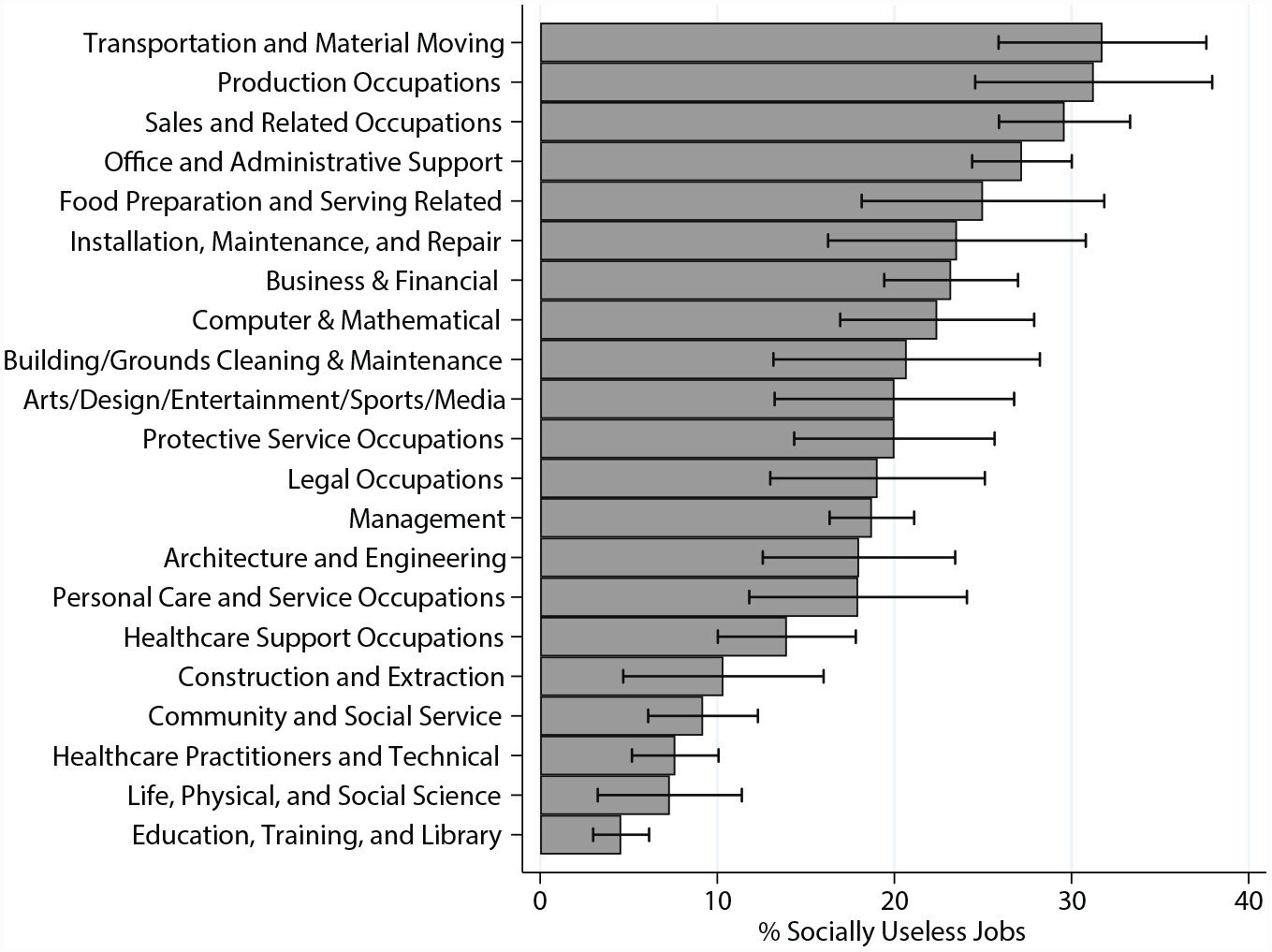The theory that many people feel the work they do is pointless because their jobs are “bullshit” has been confirmed by a new study.
The research found that people working in finance, sales and managerial roles are much more likely than others on average to think their jobs are useless or unhelpful to others.
The study, by Simon Walo, of Zurich University, Switzerland, is the first to give quantitative support to a theory put forward by the American anthropologist David Graeber in 2018 that many jobs were “bullshit”—socially useless and meaningless.
Researchers had since suggested that the reason people felt their jobs were useless was solely because they were routine and lacked autonomy or good management rather than anything intrinsic to their work, but Mr. Walo found this was only part of the story.
He analyzed survey data on 1,811 respondents in the U.S. working in 21 types of jobs, who were asked if their work gave them “a feeling of making a positive impact on community and society” and “the feeling of doing useful work.”
The American Working Conditions Survey, carried out in 2015, found that 19% of respondents answered “never” or “rarely” to the questions whether they had “a feeling of making a positive impact on community and society” and “of doing useful work” spread across a range of occupations.
Mr. Walo adjusted the raw data to compare workers with the same degree of routine work, job autonomy and quality of management, and found that in the occupations Graeber thought were useless, the nature of the job still had a large effect beyond these factors.
Those working in business and finance and sales were more than twice as likely to say their jobs were socially useless than others. Managers were 1.9 more likely to say this and office assistants 1.6 times.
“David Graeber’s ‘bullshit jobs’ theory claims that some jobs are in fact objectively useless, and that these are found more often in certain occupations than in others,” says the study, published in the journal Work, Employment and Society.
"Graeber hit a nerve with his statement. His original article quickly became so popular that within weeks it was translated into more than a dozen languages and reprinted in different newspapers around the world.
"However, the original evidence presented by Graeber was mainly qualitative, which made it difficult to assess the magnitude of the problem.
"This study extends previous analyses by drawing on a rich, under-utilized dataset and provides new evidence.
“It finds that working in one of the occupations highlighted by Graeber significantly increases the probability that workers perceive their jobs as socially useless, compared to all others. This article is therefore the first to find quantitative evidence supporting Graeber’s argument.”
Law was the only occupation cited by Graeber as useless where Mr. Walo found no statistically significant evidence that staff found their jobs meaningless.
Mr. Walo also found that the share of workers who consider their jobs socially useless is higher in the private sector than in the non-profit or the public sector.
More information: Simon Walo, “Bullshit” After All? Why People Consider Their Jobs Socially Useless, Work, Employment and Society (2023). DOI: 10.1177/09500170231175771
How is “Business and Financial” not the #1 category? I work in finance and it’s so painfully obvious that for every employee that actually does real work on a day-to-day basis there’s at least 10 that don’t do anything at all. Not even, “this work is not meaningful.” I mean, they literally don’t do anything; they keep chairs warm and write emails explaining why everything isn’t their problem or they stare at every free slot in their calendar every Monday and find ways to micro manage the people that work under them (getting in the way of those people actually doing real work).
I see memes about construction crews where one guy is digging a ditch and there’s three other guys hanging back doing nothing and I can’t help but think, “that’s actually a pretty good ratio!”
Anyone who thinks “big government” is inefficient obviously never worked for a big bank. The regulators assigned to banks are far more on top of things and turn in vastly more real work than 90% of bank employees. In fact, nearly everything in banking and finance is fully automated (when it comes to moving money around, calculating interest, figuring out if someone can get a loan, etc) that at every quarterly shareholder meeting the only ideas that are ever shared in regards to “making more money” are about cutting costs by finding ways to “run leaner” (aka laying more people off).
I also work in Finance and it is the most frustrating shit. If these people who don’t do anything weren’t actively meddling in the work of people who do, things would be better off.
Guess I’ll go into finance and scratch my balls for 40 hours a week. Wont get in your guys’ way, make bank and I’ll find ways to fill the time ;) Maybe finally get a steam deck?
As a bartender I feel that I provide a vital service to society.
Doing the work of the gods
I am shocked by this conclusion, just completely shocked I tell ya.
If it isn’t hunting, gathering or healing, it’s probably overall a pointless, meaningless job. So that’s most of us.
I wish there was a homemaker category in there somewhere.
Huh? Homemaker is a unpaid job and is very useful when it involves cleaning, organizing, and cooking.
What does that have to do with the research? I’m curious how they perceive themselves vs their contribution to society. I think it was a missed opportunity not to have included them, it would have revealed some insights not only in professional roles but in family roles as well.
I love that management is right in the center
I’m in a job field that the graph shows is one of the most unsatisfied careers, and I find my job extremely meaningful.
would you care to elaborate?
In what way?






